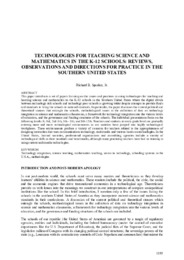| dc.contributor.author | Speaker, Richard B. Jr. | en |
| dc.coverage.spatial | CY - Λευκωσία | en |
| dc.creator | Speaker, Richard B. Jr. | en |
| dc.date.accessioned | 2016-02-23T06:41:56Z | |
| dc.date.available | 2016-02-23T06:41:56Z | |
| dc.date.issued | 2003 | |
| dc.identifier.uri | http://hdl.handle.net/10797/14767 | en |
| dc.description | Περιέχει το πλήρες κείμενο | en |
| dc.description.abstract | This paper introduces a set of papers focusing on the issues and practices in using technologies for teaching and learning science and mathematics in the K-12 schools in the Southern United States where the digital divide between technology rich schools and technology poor schools is growing wider despite attempts to provide funds and standards to bring the schools to national standards. In particular, the paper discusses the current political and theoretical stances that entangle the schools, methodological issues in the collection of data on technology integration in science and mathematics classrooms, a framework for technology integration into the various levels of education, and the governance and funding structures of the schools. The individual presentations focus on the following levels: K-3rd, 2nd-5th, 5th – 8th, and 9th-12th. Teachers and students at every grade level are gradually entering more and more technological environments as our societies have jumped into highly technological workplaces. These environments produce a variety of concerns for teachers related to the appropriateness of designing instruction that uses communications technology, multimedia and various hands-on technologies. In the United States, learned societies, professional organizations and accrediting agencies include a variety of technological skills in their standards and benchmarks, although many practicing teachers have had no training in using current multimedia technologies. | en |
| dc.language.iso | eng | en |
| dc.publisher | Department of Educational Sciences, University of Cyprus | en |
| dc.relation.ispartof | New technologies for teaching science and mathematics | en |
| dc.rights | info:eu-repo/semantics/openAccess | en |
| dc.rights | Open Access | en |
| dc.source | CBLIS Conference Proceedings 2003 Volume I: New Technologies and their applications in education | en |
| dc.title | Technologies for teaching science and Mathematics in the k-12 schools: reviews, observations and directions for practice in the southern united states | en |
| dc.type | info:eu-repo/semantics/conferenceObject | en |
| dc.subject.uncontrolledterm | Technology integration | en |
| dc.subject.uncontrolledterm | Science teaching | en |
| dc.subject.uncontrolledterm | Mathematics teaching | en |
| dc.subject.uncontrolledterm | Access to technology | en |
| dc.subject.uncontrolledterm | Schooling systems in the U.S.A. | en |
| dc.subject.uncontrolledterm | Methodologies | en |
| dc.contributor.conferenceorganizer | Learning in Physics Group, University of Cyprus | en |
| dc.contributor.coordinator | Constantinou, Constantinos P. | en |
